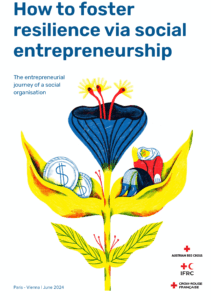How to foster resilience via social entrepreneurship

National Society Development, as an enabler of local action, purposefully contributes to helping the National Society achieve and maintain an accountable andsustainable organisation that delivers – through volunteers and staff – relevant local services to address needs, reduce vulnerabilities and build resilience in the community, in full respect of the Fundamental Principles. National Society Financial sustainability was identified by the membership as one of the key areas of National Society Development work, which stands out in need of collective investment for improvement. Specific NSD initiatives related to providing support for strengthening the four pillars of NS financial sustainability, including the Resource Mobilisation pillar (RM), are examples of NSD work fostering localisation.
Initiatives related to Income-Generating Activities (IGA), specifically related to Social Entrepreneurship and Social Enterprise within the RM pillar, are game changers, both: • at the National Society level, as they help reduce the organisation’s dependency on external funding and partners • and at the community level, as they drive social impact and empowerment, allowing the beneficiaries and volunteers to make their own decisions and to become actors of their own resilience. IGA for National Societies might include Social Enterprises focused on “traditional” domestic services such as voluntary blood donation, workplace (commercial) first aid, pre-hospital care, such as ambulance services, community-based primary health care, hospitals, clinics, sale of first-aid kits, sale of affordable second-hand clothes and formal and informal education, including for groups with special needs. IGA might also include entirely new and innovative service and product lines to obtain long-term unearmarked income, which is a very important element of f inancial sustainability, especially true for branches which, due to their situation, sometimes find it more complicated to develop other sources of income. Running a Social Enterprise requires a specific mindset and skillset. To be successful, a Social Enterprise needs to leverage expertise and know-how that is often available in commercial or business sectors and adapt it to its social goals, givingthe membership the opportunity to look outside our sector for inspiration, dare to try innovative approaches and generate lessons to be shared widely.
Initiatives, like REDpreneur and the 21 Program, to highlight as examples, are important and timely solutions which aim at developing the business skills, connections and networks needed to set up and manage Social Enterprise. This is a critical and urgent need within a large number of National Societies. There is also a growing and important need of entrepreneurs from National Societies and Communities to continue and expand the conversation started globally through the Resource Mobilisation Community of Practice (RMC). This is a strategic service developed by the IFRC Secretariat, providing National Societies with a flexible space to connect and collaborate via an agile and efficient way of working within the membership, contributing to the collective investment for improvement on National Society’s Financial Sustainability. Recognising all the above, the IFRC Secretariat reconfirms its commitment to providing leadership and delivering on the coordination and connections among key initiatives across the 4 pillars of National Society Financial Sustainability and, ultimately NSD.
